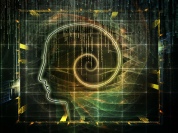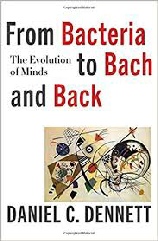




 NEXT
NEXT
 BACK
BACK

Philosophical musings on Quanta & Qualia; Materialism & Spiritualism; Science & Religion; Pragmatism & Idealism, etc.


 Forum
Forum

 Recent Posts
Recent Posts
Many theories of consciousness, what’s yours?
Post 20. March 10, 2018 continued . . .
The Riddle of Consciousness
Mind in a Material World
Dennett accurately describes Consciousness as a “nonphysical” phenomenon3, which in philosophical terms is “metaphysical”. And all of those nonphysical aspects of reality are dismissed as “illusions” instead of features, even though they are the primary concern of human activity. For example, the “illusion of the self” is the primary fact of human existence and the only thing we know for sure. As Descartes succinctly put it, “I think, therefore I am”, placing the metaphysical phenomenon of thought processes, known only to the subject, at the center of existence. According to Dennett's theory of consciousness, the conscious Self is the creation of a multi-component [Hive Mind, Society of Mind4] mechanical brain, which creates the illusion of a singular top executive [homunculus5], so it will have someone to report its conclusions to. «It is a user illusion that gives us limited access to the workings of our brains.» I agree up to a point, except that I object to the term “illusion”, and prefer the less judgmental description “imagination” : the ability of the mind to be creative or resourceful6.
He also thinks that humanity is the fortuitous result of an eons long series of blind accidents that for no reason at all, add-up to creatures that can think about their own thoughts. That sounds like a reductive account of a carefully planned magic act, in which the audience's “illusion” of a supernatural effect is merely a by-product instead the point of the whole effort. A holistic version of the magician's show would instead summarize the causes in one final effect7. Each step of the build-up may seem to be irrelevant (misdirection, distractions) to the final gasp of surprise. But, the elicited illusion is the reason for all the preliminary work. The magician depends on his audience's reductive thinking8, so they will be surprised by the “turn” of many mundane acts into a single unprecedented revelation of power over nature. In the Enformationism thesis, the only true magician is called G*D. And to G*D goes the Prestige9.
In a godless universe with no design or purpose, the emergence of consciousness is an unexplained anomaly. Scientists twist & turn in their attempts to understand the function of meaningful awareness, when simple mechanical stimulus & response, such as in bacteria, would suffice for organisms to survive and reproduce. Why introduce such illusions as Love and Fear? Physics got along well without Life for ages, and Biology works fine in plants without Knowingness. But simple animals seem to know more than absolutely necessary about what's going on around them. And meta-physical humans are even aware of things that are not, but ought to be. So why would Consciousness evolve in a mechanistic universe? What's the point?
I don't know what the end-game of the axiomatic Creator is, yet it's apparent that the world is not just going in circles, but heading somewhere for some reason. The best guess I've come across is that Consciousness is not just a “spandrel” in evolution, but a fundamental element of the structure of reality. That's the premise of Panpsychism. Perhaps Consciousness is only a problem when we try to understand it objectively. Subjectively, it is merely how we know what we know.
End of Post 20
Consciousness explained away
3. Non-Physical
Phenomena
Click here for popup
4. Hive Mind or
Society of Mind
Click here for popup
5. Homunculus :
The executive function of the brain. What I call the Self. Imagined as a “little man” in the head, who receives reports from unconscious brain functions, turning them into conscious concepts.
Dennett : “We only have access to the results of underlying brain processes, and we confabulate a model to explain what we think has happened.” “We attribute our perceptions to external causes . . .”
In this case, the homunculus is the observer of our thoughts.
6. Language of Mind :
Click here for popup.
7. Parts vs Wholes :
Click here for popup.
8. Fuzzy Logic and
Two-value Reasoning :
Click here for popup.
9. The Prestige :
Every great magic trick consists of three parts or acts. 1> The Pledge, displaying something mundane; 2>. The Turn, converting the ordinary into something extraordinary, and 3> The Prestige, making you believe that the magician has supernatural powers. But only G*D has the power to create mundane reality – “only God can make a tree”.
https://en.wikiquote.org/wiki/The_Prestige_(film)
Chance versus Choice :
The universe is self-organizing because it selects unifying paths from diverse options.
The quality of “self-organization” is innate, but it was inherited from its parent. That parent is what I call G*D, defined in a pandeistic sense.
Natural vs Supernatural Consciousness :
There are lots of theories of Mind, from ancient folk psychology to modern computational concepts. And they all get some aspects of it right, but leave other facets unexplained.
My theory is closer to Dennett’s, than to more ancient notions, except I think that elemental Infor-mation is the progenitor of both Matter & Mind, Physics & Consciousness.
I believe that conscious-ness is a natural phenom-enon, not a super-natural add-on. So I must clarify that all of the magical properties attributed to consciousness, especially in Eastern philosophies are pre-scientific theories that mis-understand how it works

Non-physical Phenomena
From a pseudoscience website :
<< Nikola Tesla said it best, “the day science begins to study non-physical phenomena, it will make more progress in one decade than in all the previous centurie of its existence.”
“I want to make it clear that my intention of presenting this information is to demonstrate that thoughts, intentions, prayer, and other units of consciousness can directly influence our physical material world.” >> [My bold]
I want to make it clear that although conscious-ness can indeed influence the physical world, it does so indirectly via normal mechanical pro-cesses.If I decide to pick up a coffee cup, nothing happens until my physical arm reaches out. Spoon-bending and cup-moving by mind-power alone are stage-magic tricks, not divine powers.
Jesus said his disciples could say to a mountain “be removed into the sea”. But such acts of prodigious faith have not been witnessed since the advent of modern science. So, if a construction contractor wants to move a mountain, he rents a bunch of heavy equipment instead of hiring the local faith healer. His mind can make mountains go away, but not by faith alone.
Non-physical phenomena (ideas,qualtities,values) are important to humans, not as tools to manipulate the material world but to influence the minds of other humans.
Hive Mind or Society of Mind
Dennett has developed a kind of hive mind theory of consciousness, in which many semi-independent elements contribute to the behavior of the system, but no single element is in charge. The hive’s unity of intention & action emerges spontaneously, from the bottom-up, not from the top-down.
Thus, he dispenses with the need for a spirit or soul or god to make a unique person out of a million cells : unity from diversity, one whole from many parts. But I still see the necessity for a top-down designer to create a universe capable of the spon-taneous order and self-organization characteristic of whole systems, but not of its elements.
Random Chance alone is destructive. But with non-random laws, initial conditions, and constants, evolution has been empowered with Natural Selection to “choose” from among many values only the one best suited to achieve a long-range goal. Thus, we have non-random progress instead of random stagnation. Thence, we have holistic behaviors in hives.
Dennett’s theory cannot explain how Holism works, top-down, to control a system, except to assume it’s an essential feature of nature. But how did such an essence emerge from the Big Bang, unless it’s potential existed prior to the beginning of time?
Language of Mind
Language is the manifestation of Consciousness. But Dennett agrees with Dawkin’s notion that words (memes) are merely informational structures that arise, like strange attractors, from random pro-cesses. << Language may have originated as in-efficient behavioral patterns. As it progressed, it may have been driven more by its benefits to memes than by its benefits to speakers.>> Thus, again dismissing the intentions of speakers as irrelevant. Hence, the development of language << can be ascribed to chance.>> But then, “chance favors the prepared mind”.
<< It’s hard to understand how uncomprehending neurons could give rise to comprehension, but they do.>> How they do it, is yet to be explained, so must be taken on faith. My guess is that the potential for Intention and Comprehension were built into the cosmos from the beginning. But by whom, or what?
Parts vs Wholes
<< Our thinking is enabled by the installation of a virtual machine made of virtual machines made of virtual machines.>> This is Dennett’s theory of multiple minds : parts adding up to wholes. But who does the addition? How does the whole emerge from the parts? He thinks we are only aware of the “User Interface”, as-if a homunculus in the brain is watching TV. In other words, Consciousness observes the “interface”, but who is the “User”, the Self, the homunculus? Who is the audience being illuded by the misdirections of the magician into believing in himself? Dennett explains away Consciousness, but provides nothing to take its place.
Two-Value Reasoning vs Fuzzy Logic
Dennett uses old-fashioned binary logic with true/false, either/or, black/white distinctions. Those artificial dichotomies were handed down from the ancient idealist philosophers, and were incorporated into the training of the early post-enlightenment scientists. A more modern and realistic form of reasoning is called Fuzzy Logic, which assumes a continuous gradation of values, such as maybe/ maybe-not. Some facts are only truish.
The BothAnd principle is based on Fuzzy Logic, and an infinite range of values. This kind of thinking is equivalent to Quantum Theory, in which normally binary (1/0) particles may exist in superposition with values anywhere from One to Zero. In Quantum limbo, existence is not a clear-cut is/ain’t, but can only be defined in mathematical terms of probabilities. In the language of Enformationism theory, a virtual particle could be 20 percent real and 80 percent “ideal”.
<< Both degrees of truth and probabilities range between 0 and 1, and hence may seem similar at first, but fuzzy logic uses degrees of truth as a mathematical model of vagueness, while probability is a mathematical model of ignorance.>> ___Wiki







 NEXT
NEXT
 BACK
BACK




 Recent Posts
Recent Posts


